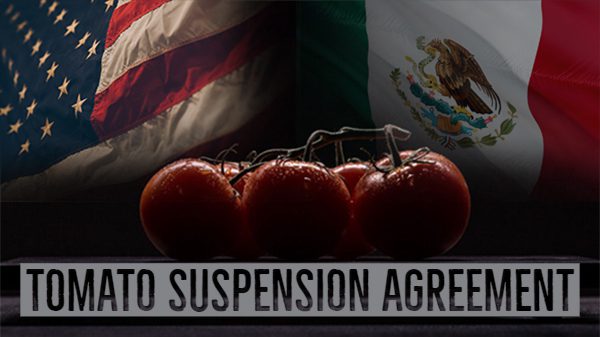The continuing Mexican tomato war, which has pitted many American growers against importers, has raised a back-and-forth between the Florida Tomato Exchange (FTE) BB #:162441, which represents growers from Florida and other American states, against the Fresh Produce Association of the Americas (FPAA) BB #:144354, which represents shippers who import the product from Latin America.
One issue is the nature of the tomatoes produced. In an article in Yahoo! Finance, Lance Jungmeyer, president of the FPAA, has been quoted as contending that Mexico enjoys a competitive advantage because of Mexican growers’ greater ability to supply vine-ripened and other greenhouse tomatoes, which consumers prefer.
In the same article, Michael Schadler, executive vice president of the FTE, countered that American farms also grow vine-ripened, greenhouse, and more conventional open-field tomatoes.
On October 23, I wrote to both Schadler and Jungmeyer for their views on this issue. Schadler’s reply appeared in this article.

Below is Jungmeyer’s reply:
“Per the Florida Tomato Marketing Order, tomatoes must be picked, handled and marketed in certain ways.
“The majority of Florida-grown tomatoes are harvested at this mature-green stage to extend the marketing period. After packing, the green tomatoes are placed in specially constructed ripening rooms and exposed to the natural ripening hormone ethylene to uniformly initiate fruit ripening.”
Jungmeyer speculated that Schadler’s reference to greenhouse tomatoes may have to do with crops grown in other states than Florida. “There have been greenhouse trials in Florida. I don’t know of any that have been particularly successful,” Jungmeyer added.
“FTE’s bid to put in duties on tomatoes is misguided and will result in higher prices on the vine-ripe and specialty tomatoes that consumers really demand, without adding much if any demand for gas-green tomatoes from Florida.
“With all due respect to FTE’s statements, here are some facts:
“Antidumping duties will not help provide the additional agricultural labor needed by domestic tomato growers.
“Imposing antidumping duties will not prevent catastrophic hurricanes or freezes, or stop the oceans from rising that are raising the salinity of growing fields.
“Antidumping duties will not improve the FTE members’ poor soil and pest conditions.
“Antidumping duties will not stem the increasing pressure of urbanization and suburbanization encroaching on farm land, especially in Florida.
“Add in the fact that consumers overwhelmingly prefer vine-ripes, the conclusion is that Florida’s industry of gas-green tomatoes lacks a clear path to success, outside of the protection of the Tomato Suspension Agreement, which sets a minimum price for Mexican tomatoes.”



